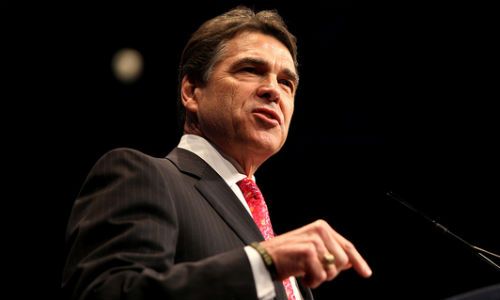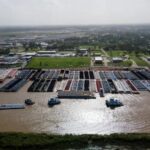You’re sitting at your desk, perusing TweetDeck and compulsively reading article comments. Suddenly an editor barks out your name.
“The Senate confirmed Rick Perry,” he or she yells from behind a jug of coffee. “Go write about it.”
We’ve got your back. Here’s the rundown on Rick Perry, the Department of Energy and story angles to keep on your radar.
A quick Perry profile
You likely remember Rick Perry as a Republican presidential candidate during the 2012 election. Perry was the longest running governor in Texas, a state flush with both oil and wind.
Unsurprisingly, different sides of the political spectrum argue over whether he’s qualified to become Secretary of Energy. Some say his tenure shows a history of generating economic growth while others say he got lucky with an oil boom and relied too much on luring companies with tax credits.
Many liberal pundits say Perry’s lack of scientific background pales in comparison to Obama’s past two picks, both of whom were physicists. But John Davidson with The Federalists argued that plenty of energy secretaries were not physicists, including when the job was created in 1977 under President Jimmy Carter.
Ironic twist
Rick Perry’s “oops” moment occurred on the debate stage during his run for the presidency. The then-governor said he’d do away with three agencies: The Department of Commerce, the Department of Education and … uh … what was that last one again? He later recalled that it was the Department of Energy.
What does the Secretary of Energy do?
The Secretary of Energy is mainly known for controlling the country’s nuclear stockpile, both weapons and waste. The department also conducts advanced scientific research and promotes energy generation through various means—including grants—on areas that include renewable energy. Its wheelhouse also includes setting energy efficiency standards, authorizing natural gas exports and running environmental cleanup efforts.
The Department of Energy’s agenda is largely set by the sitting administration. Obama placed an emphasis on solar and battery operations. President George W. Bush focused on nuclear power and decreasing the nation’s reliance on foreign oil. It remains to be seen what President-elect Donald Trump will choose to prioritize.
Stories to keep an eye on
Although Obama’s administration put a halt to the construction of the Dakota Access Pipeline, the situation is far from resolved. Perry sits on the corporate board for Energy Transfer Partners, the parent company of Dakota Access, LLC, according to USA Today. Trump has previously invested in ETP and supports the project. Reporters are keen to see what will happen in 2017.
Alec MacGillis with ProPublica detailed how Perry distributed billions in grants and tax incentives during his terms as governor. Many yielded only a third of the jobs promised; one $30 million grant went to an energy group that did not exist. The Secretary of Energy will find himself in a similar position. Newsrooms will be keeping an eye on future DOE grants.
Many Republicans believe this new administration will bolster natural gas, oil and nuclear energy. This shift can lead to many business stories. What are folks in those industries doing to prepare for the potential attitude switch? Will renewable energy producers fall to the wayside? How are renewables adjusting to the possible re-set?
This skim over the nominee should provide plenty of fuel for further investigation, and may just get your editor off your back.











